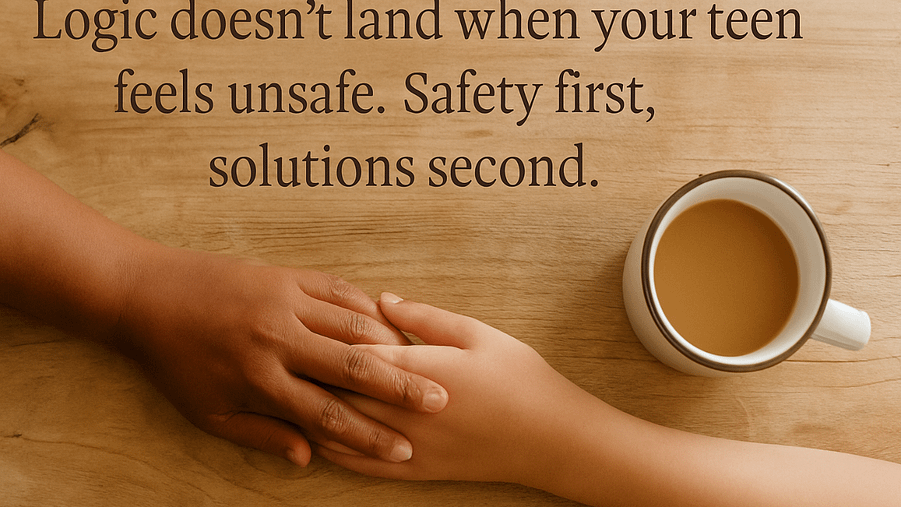Ever stood in the hallway staring at your teen’s closed door, wondering, “Did I just push them further away?”
If you’re parenting teens, you’ve felt the sting of that emotional shutdown. The silence. The shrugged shoulders. The slammed doors.
But here’s what most moms miss: Your teen’s silence isn’t always defiance—it’s survival.
More...
What “Shutting Down” Really Means
When your teen shuts down, their nervous system is doing what it’s designed to do: protect them. Their brain flips into fight, flight, or freeze—and freeze often looks like blank stares and quiet rooms.
So if you’ve been interpreting that silence as rudeness, pause. Sometimes, it’s overwhelm. Sometimes, it’s fear of saying the “wrong” thing. Sometimes, it’s a test to see if you’ll stay calm when they can’t.
Why Logic Doesn’t Land
One of the biggest blind spots in parenting teens? We come in with logic. “Just tell me what’s wrong.” “Calm down. It’s not that deep.”
It feels helpful. But for your teen, logic lands as pressure—sometimes even control. And teens crave emotional safety, not lectures, when they’re flooded.
Quick reframe: Next time your teen goes silent, trade fixing for presence. Try: “That makes sense. I’m here when you’re ready.” It gives them space to come back on their own terms.
If you want to learn how to bring this emotional safety into every conversation — especially when you’re trying to align your goals and theirs — check out Aligning Goals With Your Teen Using Emotional Intelligence.

How We Accidentally Shut Them Down
Even the most loving moms can make this mistake. We’re stressed, multitasking, and our tone changes. One sharp word—“Stop being dramatic!”—can slam the emotional door.
Ever seen This Is Us? When Rebecca snaps at teenage Kevin? He shuts down instantly. We do it, too.
This is where emotional intelligence flips the script: choose curiosity over criticism. Instead of “What’s wrong with you?” ask:
“Want me to listen or help?”
Regulate Yourself First
Your teen watches how you handle emotions more than they hear your words. You can’t calm their storm if you are the storm.
Before you speak, pause. Breathe. Your calm becomes their calm.
Silence Is Protection, Not Punishment
Sometimes that closed door is your teen’s way of protecting the relationship. They’re scared of making it worse. They’re hoping you’ll stay consistent—safe—even when they can’t find the words.
Why this matters: Silence is often their way of saying: “I don’t want to make this worse.” “I’m scared I’ll say the wrong thing.” “It’s not safe to tell the truth right now.”
Giving your teen healthy space doesn’t mean you’re hands-off — it means you’re wise enough to balance trust and independence. If you want more on how to do that gracefully, read Setting Healthy Boundaries With Teens: Trust & Independence.
3 Phrases That Open the Emotional Door
Here’s what works in real life:
✨ “That makes sense.” ✨ “I’m here when you’re ready.” ✨ “Do you want me to listen or help?”
These tiny shifts build emotional safety.

Consistency Beats Perfection
You won’t get this right every time—and that’s okay. Your teen doesn’t need a perfect parent. They need a safe, steady one who keeps showing up.
And when they finally open up? You’ll want to know how to keep that door open.
Need More Support?
If you’re ready to rebuild trust and confidence—without the power struggles—grab my book, Bridging the Teen Gap, and get the scripts, strategies, and emotional tools to reconnect for good. You’ve got this. And you don’t have to do it alone.